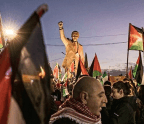Is Liberal Democracy Always the Answer?

AFTER A LONG DAY OF CAMPAIGNING FOR PRESIDENT in rural Guinea-Bissau in November 2019, Domingos Simões Pereira sat down for a late dinner.
Various leaders of his African Party for the Independence of Guinea and Cape Verde, known by the Portuguese acronym PAIGC, joined him around the table. A couple of them fought during the country’s 11-year war of independence against Portugal—which was waged in rural, isolated areas throughout the West African country and ended in 1974.
Pereira gestured to the Cacheu River, invisible in the darkness but just a few yards away. As a young boy during the war, Pereira watched artillery explode over the Cacheu; it seemed like fireworks to an 8-year-old, he recalled. Now he looked out at the same river as the potential next president of an independent Guinea-Bissau.
Pereira and other leaders have argued that after independence, in the rush to implement a democratic constitution and unify dozens of ethnic groups under one national identity, local governing practices were not incorporated into the new system. As a result, the country faces a political dilemma: How do you forge a new national identity that unites people without also acknowledging what divides them?
in its 45 years of independence. That instability, and the country’s 88 barely patrolled Atlantic islands, has helped make it an ideal transit point for drugs on their way from South America to Europe and turned it into Africa’s first narco-state. Last year, authorities conducted the country’s biggest-ever drug bust, seizing more than 1.8 tons of cocaine on the coast. Guinea-Bissau also ranks among the bottom 15 countries in the United Nations Human Development Index. (The mortality rate for children under the age of 5 is 84 per
You’re reading a preview, subscribe to read more.
Start your free 30 days





